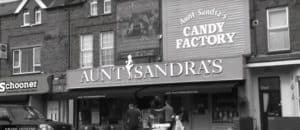Everything You Need to Know About the Currency in Northern Ireland
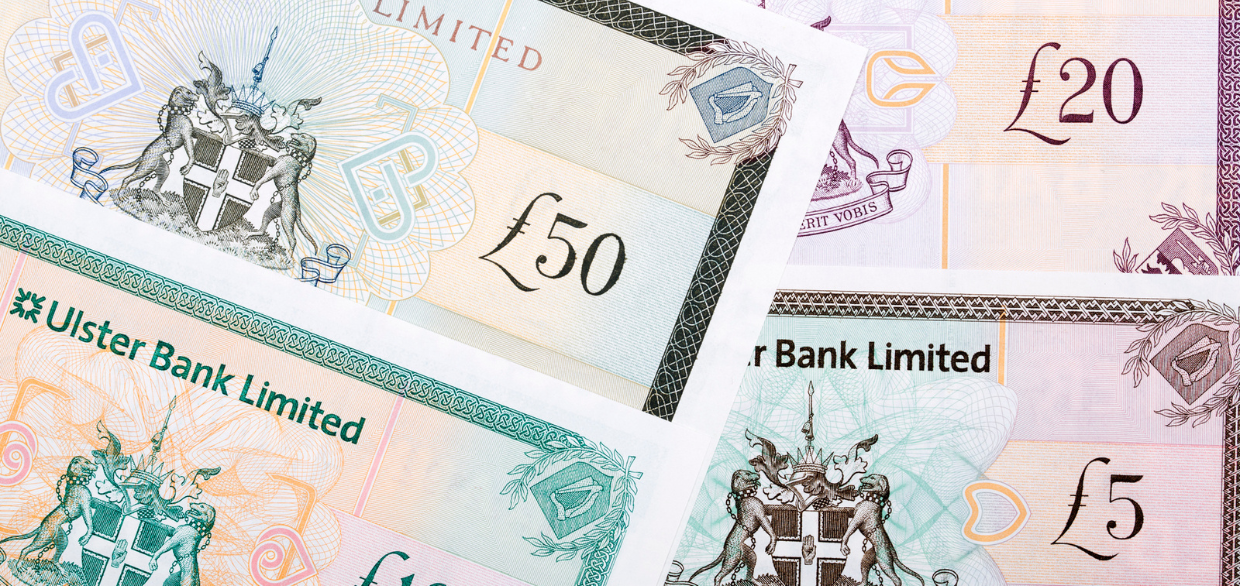
Updated On: April 26, 2024 by Maha Yassin
Northern Ireland, a land of rolling green hills, dramatic coastlines, and rich historical sites, beckons travellers seeking a unique blend of British and Irish charm. However, planning a trip to Northern Ireland involves more than just booking flights and accommodations. The island of Ireland is divided into two distinct regions, the Republic of Ireland and Northern Ireland, and so are their currencies. Understanding currency in Northern Ireland is essential for a smooth and enjoyable travel experience.
This comprehensive guide will equip you with all the knowledge you need to navigate the financial landscape of Northern Ireland, from the official currency used to helpful tips for exchanging money and making payments. Whether you’re a seasoned traveller or embarking on your first international adventure, this guide will ensure you’re prepared to explore the wonders of Northern Ireland without any financial worries.
A Brief History of Currency in Northern Ireland
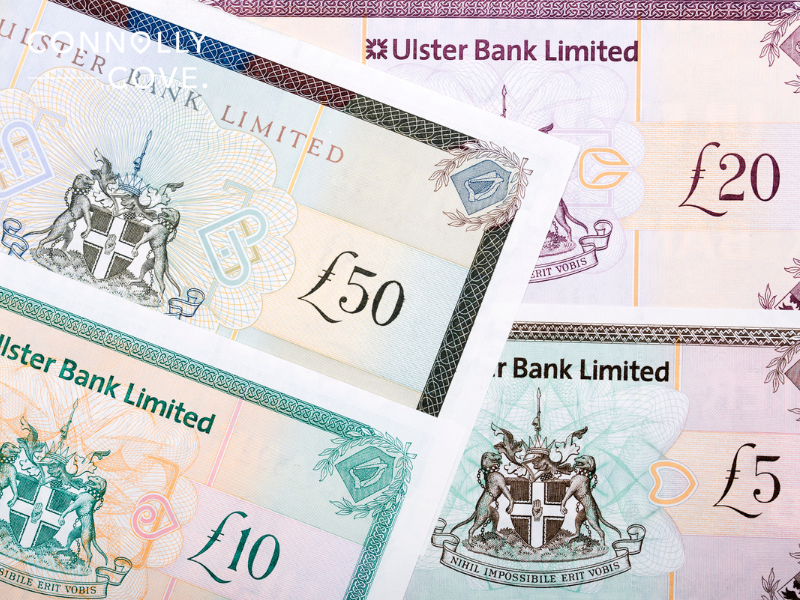
The story of currency in Northern Ireland is intertwined with the broader history of Ireland and the United Kingdom. Before establishing the Irish Free State in 1922, the entire island used the Irish pound, closely linked to the British pound sterling. However, with the creation of Northern Ireland, which remained part of the UK, the region continued to use the pound sterling.
This connection to sterling has remained a constant throughout the 20th and 21st centuries in Northern Ireland. While the Republic of Ireland transitioned to its national currency, the punt (later replaced by the euro), Northern Ireland retained the pound sterling. Interestingly, a unique feature of Northern Ireland’s currency system is the presence of banknotes issued by local banks like Ulster Bank and Bank of Ireland. These notes, denominated in pounds sterling, are legal currency in Northern Ireland but technically not legal tender (meaning they aren’t guaranteed to be accepted everywhere). However, they are widely accepted by businesses and institutions throughout the region.
Understanding this historical context helps explain the current currency landscape in Northern Ireland, where pound sterling reigns supreme, often with a local twist.
Demystifying Pound Sterling in Northern Ireland: A Traveler’s Guide
While pound sterling reigns supreme as the currency in Northern Ireland, its presence comes with interesting local variations. This section delves deeper into the specifics of using pound sterling in the region, from the familiar Bank of England notes to the unique offerings from local banks like Ulster Bank and Bank of Ireland. We’ll explore the denominations available in notes and coins, equipping you with the knowledge to navigate everyday transactions easily within Northern Ireland. Additionally, we’ll touch upon the occasional commemorative coins and limited-edition banknotes that add a touch of local flair to the currency landscape.
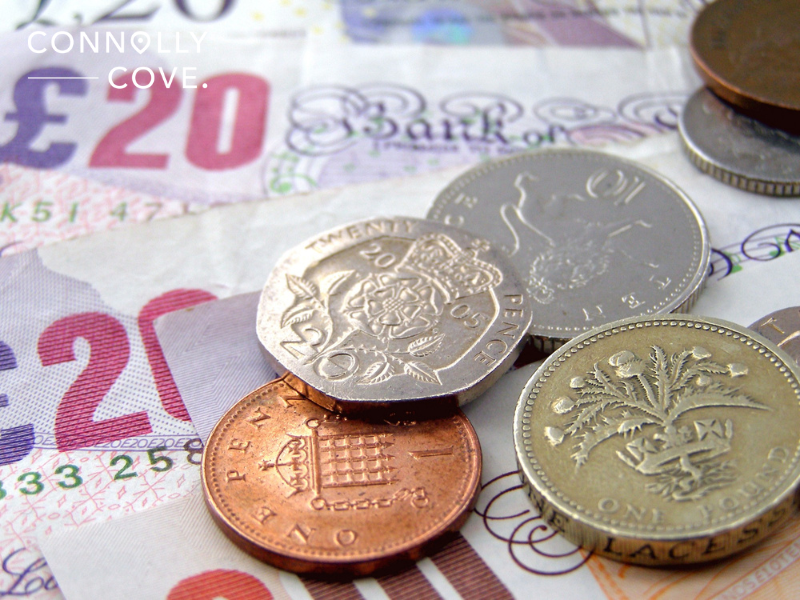
Pound Sterling (£) – The Reigning Currency
Pound sterling, universally recognised by the symbol £, is the undisputed king of currencies in Northern Ireland. This close association reflects the region’s historical and ongoing ties to the United Kingdom. For international travellers, using the pound sterling offers a sense of familiarity and stability as it’s the currency in Northern Ireland. It’s widely recognised and respected worldwide.
Navigating the Pound Sterling Landscape
Notes: Northern Ireland boasts a unique twist on pound sterling – local banks like Ulster Bank and Bank of Ireland issue banknotes, adding a distinctive touch to the currency landscape. These notes share the same value and denominations as standard Bank of England notes (£5, £10, £20) but feature distinct designs that showcase the local culture and heritage within Northern Ireland. A less common denomination, the £50 note issued by Northern Irish banks, was withdrawn in September 2023. While these local notes are legal currency within Northern Ireland, it’s important to remember they might not be readily accepted everywhere outside the region, particularly in England. For broader travel within the UK, it’s advisable to have a mix of standard Bank of England notes and local Northern Irish notes or to consider exchanging local notes for Bank of England notes before leaving Northern Ireland.
Coins: The trusty pence is subdividing the pound sterling into smaller units for everyday transactions (p). There are 100 pence in every pound, offering a familiar system for those accustomed to decimal currencies. Coins come in a variety of denominations to cater to different purchase amounts:
- Pence: 1p, 2p, 5p, 10p, 20p, 50p
- Pounds: £1, £2
Local Nuances (Optional): Keep an eye out for special editions! Occasionally, commemorative coins or limited-edition banknotes are released featuring unique designs that celebrate historical events, cultural icons, or even popular characters. These can be great collector’s items or souvenirs to commemorate your trip to Northern Ireland.
Essential Tips for Travelers: Mastering Money in Northern Ireland
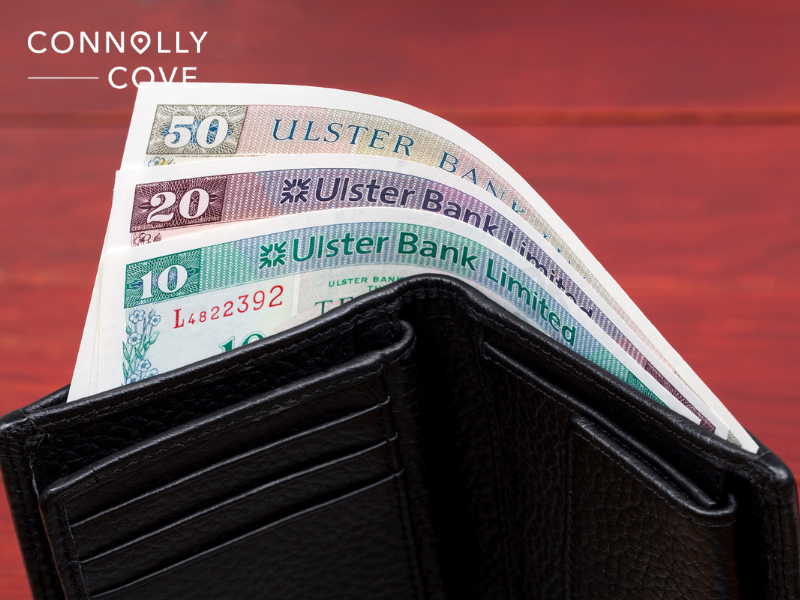
Armed with the knowledge of the pound sterling and its local quirks, you’re well on your way to conquering the financial side of your Northern Irish adventure. Here are some essential tips to ensure a smooth and worry-free experience:
Planning Ahead: Pre-Trip Currency Exchange
- Exchange a Base Amount: Exchanging a small amount of your home currency for pound sterling before departure provides peace of mind. This lets you cover immediate expenses like transportation or airport purchases without scrambling for an ATM.
- Compare Rates & Options: Research online currency exchange services or visit your local bank to compare exchange rates. Look for competitive rates with minimal fees, and don’t be afraid to shop around for the best deal.
- Consider Traveler’s Checks (Optional): While less common nowadays, traveller’s checks can offer extra security for carrying some emergency cash. However, be aware of potential fees for purchasing and cashing them.
Utilising ATMs in Northern Ireland
- Widespread Availability: ATMs are readily available in most towns and cities throughout Northern Ireland. You can withdraw pound sterling directly using your debit or credit card.
- Be Mindful of Fees: Before relying on ATMs, check with your bank about potential withdrawal fees they may charge. Some ATM operators might also impose their fees on your bank’s charges. Look for ATMs displaying network logos (e.g., Visa Plus, MasterCard) that might be part of your bank’s network, potentially reducing or eliminating these additional fees.
- Withdraw Strategically: Consider withdrawing more significant amounts less frequently to minimise the impact of potential withdrawal fees. However, balance this with the security of not carrying excessive cash.
Credit Card Convenience (with Caution)
- Widespread Acceptance: Many establishments in Northern Ireland, from hotels and restaurants to shops and attractions, accept major credit cards like Visa and Mastercard. This offers a convenient way to pay for purchases without needing large cash.
- Beware of Foreign Transaction Fees: Before swiping your credit card with glee, check with your bank about potential foreign transaction fees associated with using your credit card abroad. These fees can add up quickly and erode the benefit of using your credit card. Consider getting a credit card with travel rewards or one that waives foreign transaction fees altogether.
The Limited Role of Euros
- Republic of Ireland Currency: While the Republic of Ireland, just across the border, uses the euro, its acceptance in Northern Ireland is limited. You might encounter some euro acceptance in border areas but don’t rely on it as your primary means of payment.
- Inconvenience & Unfavorable Rates: Relying solely on euros for transactions in Northern Ireland can be inconvenient, as not all shops will accept them. Additionally, you might get unfavourable exchange rates when converting euros to pounds sterling at the point of sale.
Embrace Local Notes (with Awareness)
- Local Flair: Don’t hesitate to use the local pound sterling banknotes from Northern Irish banks. They often showcase unique designs that reflect the region’s culture and heritage.
- Acceptance Outside the Region: Just be mindful that these local notes might not be accepted everywhere outside Northern Ireland, particularly in England or other parts of the UK.
- Plan for Leftovers: Before departing Northern Ireland, consider exchanging leftover local notes for standard Bank of England notes. This ensures you can easily use your remaining cash when you return home.
Following these comprehensive tips, you can confidently manage your finances throughout your trip to Northern Ireland. Remember, a little preparation goes a long way in ensuring a stress-free and enjoyable travel experience, allowing you to focus on exploring the beauty and charm of this captivating region.
A Smooth Financial Journey Awaits
Understanding the currency landscape in Northern Ireland empowers you to navigate your trip with confidence. By familiarizing yourself with the pound sterling as the dominant currency and the unique presence of local banknotes, you’re well-equipped to handle everyday transactions. The essential tips in this guide equip you with the knowledge to exchange currency effectively, utilise ATMs strategically, and leverage credit cards wisely. Remember, a little planning goes a long way. With these financial considerations addressed, you can focus on what truly matters – immersing yourself in the rich tapestry that is Northern Ireland.
Beyond the Currency
This guide has focused on the practicalities of currency exchange and usage, but remember, money is just one aspect of a fulfilling travel experience. Northern Ireland boasts a vibrant culture, stunning landscapes, and a warm visitor welcome. Embrace the opportunity to explore ancient castles, explore the region’s fascinating history, and savour the delectable local cuisine.
Embrace the Unexpected
While planning is essential, sometimes the most memorable moments arise spontaneously. Don’t be afraid to venture off the beaten path and discover hidden gems. Embrace the unexpected encounters and friendly conversations that uniquely charm your travels.
Ultimately, the most valuable souvenirs you’ll bring back from Northern Ireland won’t be tied to your wallet. The memories you create, the connections you forge, and the sense of wonder you experience will truly enrich your journey. So go forth, confidently explore, and let Northern Ireland weave its magic!
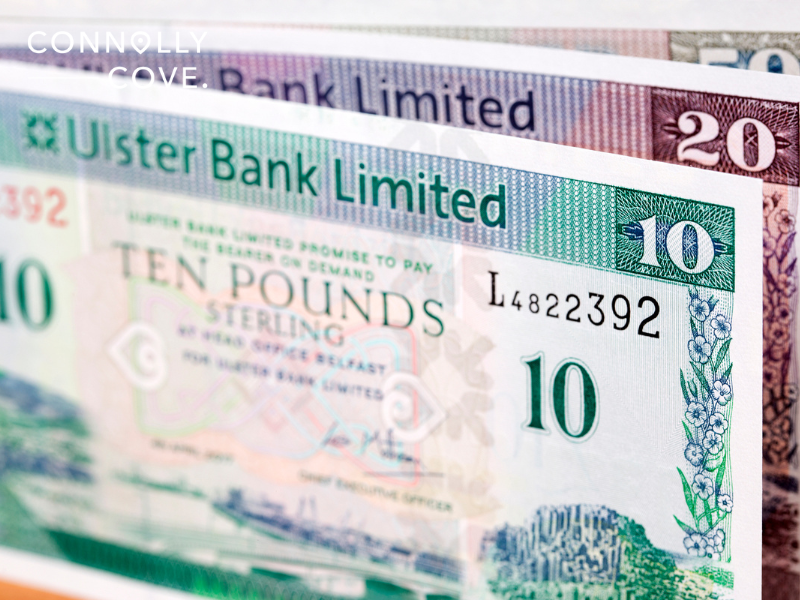
FAQs
Are there any other currencies accepted in Northern Ireland?
Euros (€) might be accepted in some border areas, but it’s not a reliable form of payment throughout the region. For most transactions, you’ll need pound sterling.
What denominations of pound sterling notes are available in Northern Ireland?
Northern Ireland features its series of banknotes issued by local banks. These come in denominations of £5, £10, and £20. Standard Bank of England notes are also widely circulated. The £50 note issued by Northern Irish banks was withdrawn in September 2023.
Can I use local Northern Irish banknotes outside the region?
While legal currency within Northern Ireland, local banknotes may not be accepted everywhere outside the region, particularly in England. It’s advisable to have a mix of standard Bank of England and local notes or exchange leftover notes before departing.
Where can I exchange my currency for pound sterling?
You can exchange your currency for pound sterling before your trip through online services, your local bank, or airport currency exchange booths (be mindful of potentially higher exchange rates at airports). ATMs in Northern Ireland also allow you to withdraw pound sterling directly using your debit or credit card (be aware of potential withdrawal fees).


